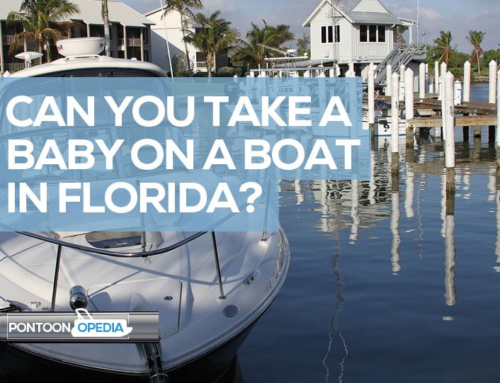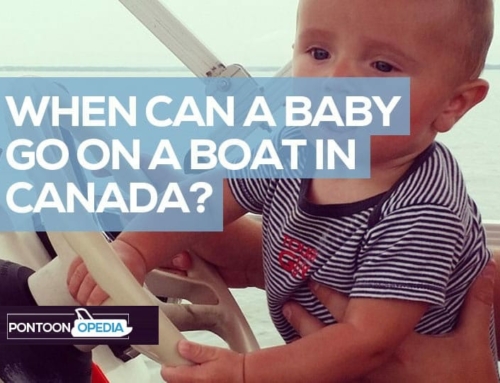Start them young is the old adage, but let’s be honest taking a baby or toddler on your boat is kind of scary due to the inherent dangers involved.
But it’s not impossible and just because you’re a new parent (or a grandparent) it doesn’t mean your love of the water has to end.
Providing you exercise common sense and follow safety tips, there’s no reason why you can’t bring toddlers and babies on board your pontoon boat or any other boat for that matter – with the exception of course being kayaks, fast motorboats, or similar.
But is it safe to take a baby on a boat? Yes of course, but it’s only as safe as the parents and guardians make it… and I have years of experience in doing so, having taken our own toddlers on our pontoon boat.
However, let me make one thing clear; the US Coast Guard recommend you don’t until such time they are able to have a life vest properly fitted.
It’s worth checking your local state regulations on life jackets to see what it says about the appropriate ages where you will be boating. You can do that on the USCG website.
Whether you’re taking a 2 year old on a boat, or are bringing your baby on board for the first time, the hints and tips below should help put your mind at ease.
1. Have Properly Fitting Infant Life Vests
I am going to assume you already have a suitably sized life jacket or vest for your toddler as it’s just ridiculously obvious.
However, the life vest should properly fit them, with the US Coast Guard’s recommendation being that a child should be at least 18 pounds before they can wear one properly.
The types of life vest to opt for should be a child suitable one, and those will have straps that go between the legs, turn the toddler head up when in water, and also have grab handles on them for the adults to hold. It’s way safer to use a life vest over a puddle jumper.
My preferred brand of toddler life jackets is Stohlquist (view on Amazon).
They are Coast Guard approved, come in bright colors, and you can find the right size and weight to suit your toddler.
2. Talk to Your Toddler Before You Boat
You should prepare your toddler well in advance of taking him or her on your boat. I found that the 2 year old mark was about the right age when it was possible to start talking about the dangers of boating.
As pontoon boat owners, we paid particular attention to explaining how the gates and rails should not be played with, and to not go anywhere near the sides of our boat.
3. Keep an Eye on Them 100% of the Time
If you have 2 toddlers aboard your boat, it’s not always going to be possible to keep your eye on them at all times.
What my wife and I did when our kids were younger was pair off the responsibility. That meant I was responsible for watching the 2 year old, and she was responsible for the 4 year old.
Never assume that someone else is watching your toddler on the boat. Always assume that if you aren’t watching them, nobody is.
4. Designate a Safe & Protected Area on the Boat
But let’s be practical here. There are going to be times when you need to focus on another task whether that’s dropping an anchor or docking. And when you’re doing that, you can’t possibly be 100% focussed on the infant.
That’s where a designated secure area can help.
All you do is find a place where you can seat the baby safely without there being any risk to them falling or moving about.
A friend of mine made a pallet out of life jackets and laid the baby on floor beneath the driver’s seat, well away from the side railings.
Handy Hint: Want to know what accessories I recommend for babies on boats? I’ve put together an essential list of the best baby boat gear containing all the items you should consider.
5. Toddlers Should Have Had Swimming Lessons
Our kids were taught to swim from a young age, and we even had baby swimming lessons. By 2 years old they could swim to a reasonable standard.
That’s quite uncommon I agree, but at the very least if your planning on taking a toddler on your boat, they should have had some exposure to swimming lessons well in advance.

Drowning is a huge problem where young children are concerned so make sure you are safe and prepared at all times – Statistics from Stop Drowning Now website.
After a few months of regular lessons, your young child should have the basic tools and knowledge they need to keep themselves floating before being rescued by an adult.
Handy Hint: Go take a look at excellent Infant Swim website which has loads of resources and tips for toddler and baby swimming.
6. Learn The Correct Way to Swim with a Toddler
Should you toddler fall into the water the best way to deal with the emergency is for the adult to use a back stroke, with the toddler on the adult’s stomach.
By swimming like this when rescuing them, it lessens the water resistance against you, and keeps the infant’s face out of the water.
As an adult you will find this almost impossible when wearing a life jacket yourself, so get that off you before you jump in – otherwise it will make you tire quickly, will be heavy, and will restrict how well you can swim with the toddler on your belly.
7. Keep Pontoon Gates Closed at All Times
If you own a pontoon boat as I do, then they have certain design features that can present hazards for toddlers and none more so that the gates built in to the side railings.
Keep the gates closed and secured at all times, and if there’s even the slightest of faults with the gate, get it repaired and fixed up before taking your toddler on the pontoon boat.
You can even put some sort of lock on the gate latches. My son loved to open the gates when he was three years old and under so I put bolts on the two side gates, and we only used the one up front.
8. Don’t Let Toddlers Lean Over the Side Railings
All pontoon boats have a side railing around the deck. They are very high, and taller than toddlers, but some will have gaps in and can make for tempting ladder type obstacles to climb up on.
Before taking your toddler on the boat, check the pontoon railings are secure, and possibly block up the bottoms as smaller children can slide through the gaps.
9. Keep Babies in Your Arms
The safest place for a baby to be seated on your boat is in your arms.
By keeping the baby on your lap and held close to you it removes any chance of injury from the boat moving and means they don’t risk falling over or rolling around.
Even when in your arms, they should still be wearing an infant life jacket at all times whilst the boat is in motion.
10. Wear Water Splash Detection Child Safety Alarms
You can buy wristbands that your toddler wears. When the wristband gets wet, an alarm sounds off.
That means you have the peace of mind in knowing if they do hit the water when you take your eye off the ball, an alarm will sound so you can spring into action.
I’ve not used one of these toddler boat safety systems before but have found a product on Amazon that looks like it would work well.
It’s called the Safety Turtle on Amazon.
11. Be on the Look Out for Rough Water Chops
On larger bodies of water, you are at the mercy of rough water and wakes. If you think the wind is getting stronger then it’s probably a good point to head back to shore.
If that’s not possible and you are hit by an unexpected large water chop it can be very unsettling for a toddler who isn’t used to being rolled around on a boat.
Whilst toddlers and babies aren’t as prone to seasickness as grown ups, they can still get ill when at sea. Here’s some information on baby seasickness prevention.
12. Keep Babies and Toddlers Out of the Sun
The sun can feel even hotter when you’re on a boat so make sure that you have them wear a floppy hat that covers their ears and neck. But essentially, they should really be kept in the shade, especially during the warmest part of the day.
If you own a pontoon boat, then the Bimini should always be deployed to give them plenty of shade. Check to see that your Bimini and awning is properly working before you leave the dock or marina.
13. Make Sure They Wear Plenty of Sunscreen
Following on from the last point, even in the shade they could be sunburnt so make sure you have high factor sunscreen for your toddler. It should be toddler approved sunscreen too.
As far as I am concerned you can never use enough of this stuff. Particularly on a boat, as the wind will often deceive you as to how hot the sun actually is on open water areas.
Please also be aware that you should not apply sunscreen to a baby under 6 months old. Their skin is too thin for it, and it can actually harm them. Instead, keep them covered up and in the shade properly.
14. Tired Toddlers Don’t Make for Great Passengers
I’ve had three kids who have grown up with us boating, and in my experience when they start to get tired in the toddler years then it’s time to call it a day.
Unless you own a super yacht, there’s no respite from a cranky toddler on an average sized boat, so get back to shore, get them in the car seat, and hopefully they will fall asleep in peace on the way home!
15. Keep them Hydrated with Loads of Water
Keeps loads of fresh water on your boat and keep your toddler well hydrated.
With babies it’s even more important to keep them topped up with lots of fluids is because babies can’t tell you if they’re dehydrated.
16. Don’t Forget the Porta Potty
Toddlers want to pee at the most inconvenient of times, so it pays to be prepared.
You can buy porta potties especially made for boats, and I’ve actually reviewed a few them already on Pontoonopedia. Click here to see which porta potties I recommend.
17. Bring Plenty of Activities for Entertainment
Kids can get bored very easily so bring something along that they love. In the past we bought the color magic books where the ink only works on the special coloring books.
Believe it or not small kids aren’t happy just relaxing and taking a nice boat ride unlike us adults!
If you have some fun games and activities for them to play, at least you have something to break out when they get cranky and tired.
Handy Hint: Here’s a list of games plus also some fun activities that you can play on your boat to help keep kids of all ages entertained and happy.
18. Don’t Run Out of Food!
I swear that boating used to make my kids so hungry when they were younger!
They normally barely ate a thing, but if we were on our boat they would run through the snacks in no time at all, so I would always bring a ton of sliced fruit, sandwiches and snacks.
Handy Hint: Here are some great ideas for simple finger food which are ideal for boating plus don’t need refrigeration or coolers.
19 to 21. Plus Even More Tips and Advice
I said 21 tips for taking toddlers safely on your boat didn’t I?
The above is my advice, but you can find even more safety and practical tips listed in the additional comments that you see below.
As well as my own tips on boating with toddlers and babies, plus safety advice, I also took a look at what other boat owners were saying online.
Here’s a small selection of comments from the pontoon boat community about how they keep their toddlers entertained and safe out on the water.
“When I was younger my mom put a playpen on the boat and there was a perfect little nook for it! From what she tells me I didn’t spend the whole time in there, but it helped so that my parents could enjoy the day without constantly worrying about baby overboard.”
“When your kids are a little older try taking a small inflatable kiddie pool on board. Fill it up a little way using a bucket, so the little ones can play in the water even if the lake isn’t quite warm enough for everyone else to swim in.”
“My toddler always wears his life jacket. And my 6 year old doesn’t swim too well but loves to get in the water so we use a 20 foot rope tied to the back of the boat with a life jacket tied to the end of it. I throw that out every time we stop to swim and that’s his safety zone. For the most part I’m in there with him as well.”
“We bought Velcro straps to secure and strap all of the doors on our pontoon boat. My four year old figured out how to lift up the door so I wouldn’t leave the dock until every door is secure and Velcro worked just perfect.”
“Get your toddler some beginner swimming lessons from a professional. Then look for the whole-body PFDs or the puddle jumpers. Do not let your child convince you they don’t need or like their PFD A bit of discomfort is not worth what could happen if they go into the water unintended.”
“I take out my 2 and 5 year olds and never leave home without their kiddie fishing poles (and yes we do leave the little blue plastic fish attached). They will then spend hours casting them out and reeling them in. Sometimes we put live bait on and let them catch bluegills.”
“Our kids have been boating since they were babies. There are already some great safety tips about life jackets and sunscreen, the food thing for us is huge! We joke that the kids think the smorgasbord opens the second we pull away from the dock.”
“My grandson has been on our boat since he was 8 months old and he loves it. Children have to wear a life jacket at all times when the boat is moving, and a good idea to have it on at all times. Buy good quality life jackets, then take the child in the water and see which way the jacket rolls them if they fall in. Some jackets want to roll them face down. A good jacket rolls them onto their back.”
“We take our infant on the boat all of the time and have found a life jacket that he likes. We have a mini pack-n-play of toys for him that we keep on the pontoon boat permanently and we keep a couple of umbrellas on the boat to give him some extra shade.”
“A pontoon is probably the safest type of boat you could have with a toddler. Just make sure the gates have latches, he can’t climb over the seat backs or railing and that he has his life jacket on at all times.”
“My 5 ½ year old loves the lake but we don’t actually have our own boat yet. Make sure you have life jackets like everyone else has said. I find that kids love the wind in their face and our toddler loves riding across the waves and would stay out all day if she could!”
“We have an 8 month old and a 3 year old niece and love the high rails on our Aqua Patio pontoon boat. You can also get latches for the gates. They were with us on the lake for about two hours this past weekend and did just fine. In fact, both fell asleep at some point! I would advise that you invest in drown proofing swimming lessons.”
The Last Word
Boating with a toddler can be a lot of fun and as a boating family we were keen to get out kids started as early as possible in life.
We didn’t want them to grow up being afraid of the water, so introducing them at an early age, and teaching them responsible boat behavior was so important to us.
I hope that you have found these ideas useful, and if you do have anything more to add about taking a baby on a pontoon boat or introducing a toddler to boating then I would love to hear from you.
You can contact me via the usual social media channels.
Happy boating!

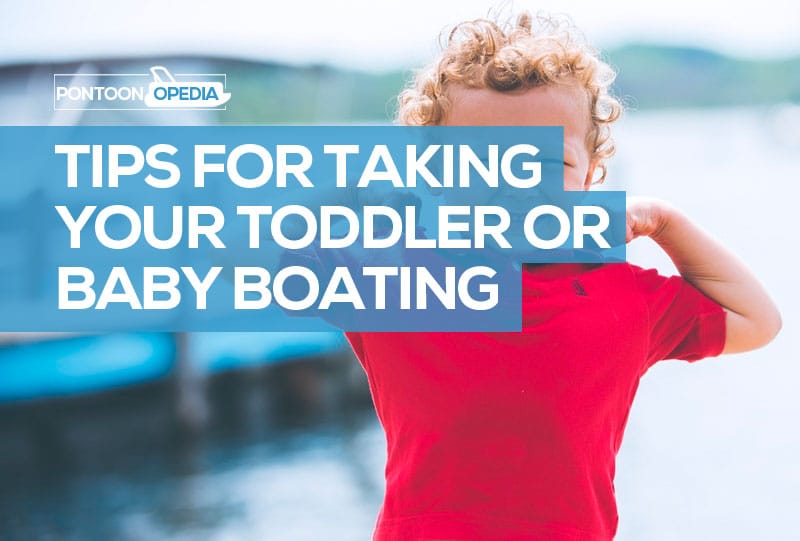


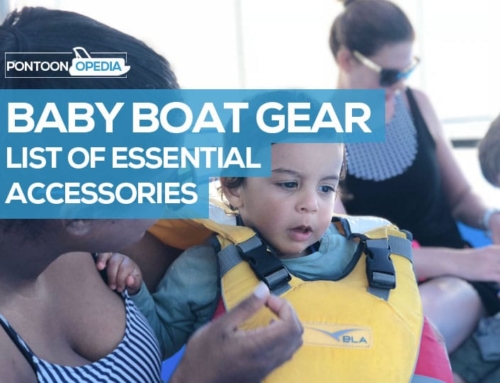
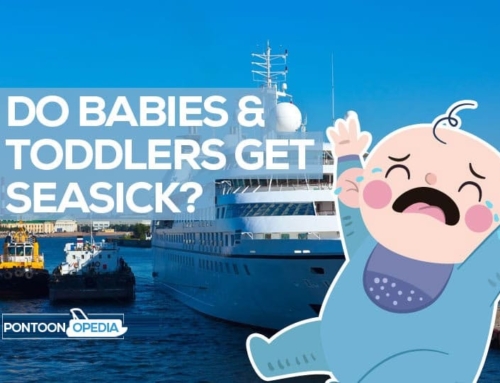
![Do Child and Baby Car Seats Float in Water? [ READ WARNINGS ]](https://pontoonopedia.com/wp-content/uploads/2018/09/car-seats-float-500x383.jpg)
